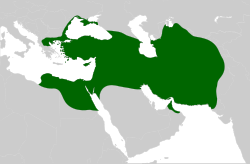Persian people
The Persians are an Iranian ethnic group who speak the Persian language as their native language, being around 49 million in Iran, forming 61% of the population.
| Total population | |
|---|---|
| c. 49 in Iran million[1] | |
| Iran: 49 million (61% of total population) | |
| Languages | |
| Persian | |
| Religion | |
| Mostly Shia Islam |
Related pages
Persian People Media
Map of the Achaemenid Empire at its greatest extent
Persian warriors led by Darius III in the antique Alexander Mosaic
A bas-relief at Naqsh-e Rustam depicting the victory of Sasanian ruler Shapur I over Roman ruler Valerian and Philip the Arab
One of the first actions performed by Shāh Ismā'īl I of the Safavid dynasty was the proclamation of the Twelver denomination of Shīʿa Islam as the official religion of his newly founded Persian Empire
Old Persian inscribed in cuneiform on the Behistun Inscription
A Persian carpet kept at the Louvre
Dancers and musical instrument players depicted on a Sasanian silver bowl from the 5th-7th century AD
References
- ↑ "Persian, Iranian". Ethnologue. Retrieved 11 December 2018. Total Iranian Persian users in all countries.







